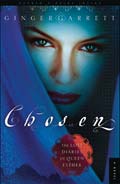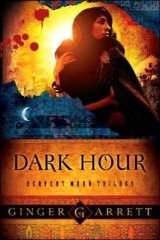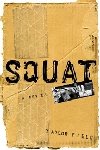
It is October 1st, time for the FIRST Day Blog Tour! (Join our alliance! Click the button!) The FIRST day of every month we will feature an author and their latest book's FIRST chapter!
Guess what? The publicists for Ginger have agreed to a book contest for each FIRST member's blog post on Dark Hour! It is up to the member on how they judge which commenter wins the free book...so, comment and you might become a winner!
About the author:
Ginger Garrett is an acclaimed novelist and expert in ancient women's history. Her first novel, Chosen, was recognized as one of the best five novels of the year by the Christian publishing industry. Ginger enjoys a diverse reader base and creates conversation between cultures.
Her first novel, Chosen, was recognized as one of the best five novels of the year by the Christian publishing industry. Ginger enjoys a diverse reader base and creates conversation between cultures.
In addition to her 2006 and 2007 novels about the most evil women in biblical history, she will release Beauty Secrets of the Bible (published by Thomas Nelson) in Summer 2007.
Ginger Garrett's Dark Hour delves into the biblical account of Jezebel's daughter and her attempt to end the line of David.
 And now, a special Q&A with Ginger Garrett:
And now, a special Q&A with Ginger Garrett:
1.) First, tell us a bit about Dark Hour.
I was praying about what book to write after Chosen, and accidentally left my open Bible on the kitchen table. (A dangerous thing, since in my house, small children and large dogs routinely scavenge with dirty hands and noses for snacks!) As I walked past it, I saw a caption about someone named Athaliah and a mass murder. I stopped cold. I knew it was my story.
One woman, her step-daughter, Jehoshebeth, defied her. She stole a baby during the massacre and hid him. Between them, the two women literally fought for the fate of the world.
2.) What drew you to write biblical fiction?
The similarities between the lives of ancient women and our lives. We get distracted by their "packaging," the way they dressed and lived, but at heart, our stories are parallel.
3.) How much time is spent researching the novel versus writing the novel?

Equal amounts, and I don't stop researching while I write. I have a historical expert, probably the best in the world in his field, review the manuscript and point out errors. The tough part is deciding when to ignore his advice. He pointed out that most everyone rode donkeys if they weren't in the military, but a key scene in the novel involves riding a horse to the rescue. It would have been anti-climatic to charge in on a donkey! :) So I ignored his advice on that one.
4.) Dark Hour takes its reader deep into the heart of palace intrigue and betrayals. Were parts of this book difficult to write?
I left out much of the darkest material I uncovered in research. It was important to show how violent and treacherous these times and this woman (Athaliah) could be, but I tried to be cautious about how to do it. The story was so powerful and hopeful--how one woman's courage in the face of evil saved the world--but the evil was depressing. I tried to move quickly past it. I wanted balance. Our heroine suffers and some wounds are not completely healed in her lifetime. That's true for us, too.
5.) What would modern readers find surprising about ancient women?
They had a powerful sense of the community of women. They also wore make-up: blush, glitter eyeshadow, lipstick, powder, and perfume! They drank beer with straws, and enjoyed "Fritos": ground grains, fried and salted. Many of our foods are the same today, but they loved to serve pate made from dried locusts, finely ground. Ugh!
 Without further ado...here is the FIRST chapter of Dark Hour by Ginger Garrett. Judge for yourself if you'd like to read more!
Without further ado...here is the FIRST chapter of Dark Hour by Ginger Garrett. Judge for yourself if you'd like to read more!(There is a prologue before chapter one regarding the birth of Jehoshebeth... Athaliah is not Jehoshebeth's biological mother.)
c h a p t e r O n e
Fifteen Years Later
HER BARU, the priest of divination, opened the goatskin bag and spread the wet liver along the floor, leaving a path of blood as he worked. Retrieving a wooden board and pegs from his other satchel, the satchel that held the knives and charms, he placed pegs in the board according to where the liver was marked by fat and disease. He turned the black liver over, revealing a ragged abscess.
Athaliah covered her mouth and nose with her hands to ward off the smell but would not turn way.
“Worms,” her sorcerer said, not looking up. He placed more pegs in the board before he stopped, and his breath caught.
A freezing wind touched them, though they were in the heart of the palace in the heat of the afternoon. Athaliah cursed this cold thing that had found her again and watched the sorcerer search for the source of the chill before he returned to the divination. There was no source of wind here; in her chamber there was a bed, the table where her servants applied her cosmetics from ornate and lovely jars shaped like animals, a limestone toilet, and in the farthest corner so that no one at the chamber door would see it, her shrine. Statues of Baal, the storm god, and the great goddess Asherah, who called all life into being, stood among the panting lions carved from ivory and the oil lamps that burned at all hours. Here she placed her offerings of incense and oil, and here she whispered to the icy thing as it worshiped alongside her.
The baru watched as the flames in the shrine swayed, the chill moving among the gods. The flames stayed at an angle until one began to burn the face of Asherah. Her painted face began to melt, first her eyes running black and then her mouth flowing red. He gasped and stood.
“I must return to the city.”
Athaliah stood, blocking him from his satchel.
“What does the liver say?”
“It is not good that I have come. We will work another day.”
She did not move. He glanced at the door. Guards with sharp swords were posted outside.
“A dead king still rules here. You set yourself against him
and are damned.”
Athaliah sighed. “You speak of David.”
The baru nodded and bent closer so no other thing would hear his whisper. “There is a prophecy about him, that one from the house of David will always reign in Judah. His light will never die.”
“I fear no man, dead or living.”
The baru continued to whisper, fear pushing into his eyes, making them wide. “It is not the man you must fear. It is his God.”
Athaliah bit her lip and considered his words. She wished he didn’t tremble. It was such a burden to comfort a man.
“Yes, this God. It is this God who troubles us. Perhaps I can make an offering to Him. You must instruct me. Stay, my friend, stay.” She patted him on the arm, detesting his clammy flesh. “I have dreamed,” she confessed. “I have a message from this God, and I must know how to answer Him.”
The baru took a step back, shaking his head. “What is this dream?”
“A man,” Athaliah said.
“Tell me.”
“At night, when I sleep and the moon blankets my chamber, I see a man. He is not as we are: he is coarse and wild. He wears skins hewn from savage beasts, run round his waist with careless thought, and in his mind he is always running, ax in hand, running. I feel his thoughts, his mind churning with unrest, and he knows mine completely. I hear a burning whisper from heaven and shut up my ears, but he turns to the sound. A great hand touches him, sealing him for what lies ahead, and speaks a name I cannot hear, a calling to one yet to be. I try to strike this man, but all goes red, blankets of red washing down.”
She licked her lips and waited, breathing hard. The baru nodded.
“You see the prophet of Yahweh, Elijah, who plagues your mother.”
The baru began to reach for his goatskin sack. He picked up the liver and put it in the sack, keeping an eye on the door as he wiped his bloody hand on his robes. She knew he was measuring his steps in his mind, thinking only of freedom from here, and from her.
Athaliah grabbed his arm. “I let those who worship Yahweh
live in peace. They mean nothing to me; what is one God in a
land of so many? Why would this God send a man to make war
on my mother and then claim me also?”
The baru narrowed his eyes. “This God is not like the others.”
“How can we be free of Him?”
The baru thought for a moment then reached into his satchel. He pulled out a handful of teeth and tossed them on the ground at her feet. She did not move.
He squatted and read them, probing them with a shaking finger. She watched as the hair along his neck rose, and goose bumps popped all along his skin. The cold thing had wrapped itself tightly around him. She could see his breath.
“There is a child,” he said. “The eye of Yahweh is upon this child, always. I must counsel you to find this child and kill it, for when it is gone, Yahweh would trouble you no more.”
Athaliah murmured and ran her teeth over her lips, biting and dragging the skin as her thoughts worked back in time. “It is my daughter you speak of. Only a girl. But even so, I cannot kill her yet. I would lose my rights as the most favored wife. I will not risk my crown for so small a prize. No, I will find another way to get rid of her, and I will deal with this threat from Yahweh as I must.”
Athaliah walked to her shrine and cleaned the face of Asherah. She could hear the baru scooping the teeth back into the bag. She turned with a sly smile, pleased that her mind worked so quickly even with the cold thing so near.
“My mother has already angered this God. We will let her have our problem. She has a talent for these things.”
He had finished putting everything back into his two sacks and edged toward the door. She wondered if he would return. He was the best she had at divining dreams and saw in the liver so many answers. She sighed and tried to think of a word to reassure him.
“A farmer may own the field,” she began, “but much work is done before a harvest is even planted. Stones are removed, weeds are torn free. We must break loose the soil and uproot our enemies so the field will be ready. On that day I will sow richly.”
He managed a weak smile.
“Let your appetite grow, my friend,” she coaxed. “The harvest is coming.”
He fled so quickly she knew her words had been wasted, as all words were on frightened men. He would never return.
He dined in a dim, private room with his advisers. The room was adjacent to the throne room, where he would one day rule, and was bare, save for an oil lamp on a low table. Cedar beams topped the limestone walls, giving the palace a sweet, smoky scent under the afternoon sun. The men sat around the table, scattered with maps, sharing a lunch of grapes, bread, wine, and cheese. Normally they would eat more, and in the dining hall, but the kitchen servants were busy preparing for the great send-off feast and it was easier to be served here.
Tomorrow, his father, King Jehoshaphat, would lead Judah’s army north toward Israel and King Ahab. Together, the two kingdoms would fight their inconstant friend Ben-Hadad to end his trade monopolies. Ben-Hadad fought alongside them against the cruel Assyrians but turned often and claimed the richest of trade cities for himself.
“There are implications, my prince,” Ethan said. Ethan was the tallest, and his skin turned red when he was angry, which was often. His temper had plagued him since he and the prince were boys, but now Jehoram no longer found pleasure in goading his friend. “If the kings succeed at Ramoth-Gilead against Ben-Hadad,” Ethan continued, “and the proposed alliance is
accepted, your father will have obligations both to the north and south. In this way, Ahab’s kingdom will be strengthened by this victory, and your own kingdom will be compromised. Judah may weaken and fall at last to a king of Israel.”
“I have married the daughter of Ahab,” Jehoram replied. “I have given their daughter an heir and promised her the crown. I have curried the favor of the north well enough. They will not turn on me, for their own daughter is at my side.” He tried to entertain himself with the food and wine while his advisers prattled on. He wondered what would be served at the feast tonight. If the servants’ exhausted expressions were any indication, the spread would be remarkable.
“That is true, my friend,” Ethan said. “But you are wrong to think this is Ahab’s war. It is a woman who is shaping this new world. Think on this: What does the powerful Jezebel desire more than to bring glory to her own name? She wants the north and south reunited so that she may one day rule them both, a queen equal in power to Solomon.”
Ethan smirked as he continued. “Everyone knows Ahab wears the crown but Jezebel rules. With Ahab and Jehoshaphat together in battle, their voices silenced for a time, Jezebel will be listening for yours. Let her know a lion roars in Judah. We will never be ruled by a woman, especially one who hides behind her husband’s crown.”
Jehoram listened, running his tongue across his lips, catching a spot of wine resting just above his lip. Ethan was his truest friend, if a man about to wear the crown had one, but he was always ready for a fight. Jehoram preferred to suffer a blow and stay with his women and wine. He sighed. “Ethan, you look into darkness and see monsters, but I see only shadows. It has always been this way.”
Ethan frowned. “We are no longer children hunting with our fathers at night. Listen to me, for I am the voice of God in your ear.”
Jehoram turned his face away and crossed his arms. Then he sighed and reached for a bowl of grapes and began to eat. He did not like an empty stomach.
Another adviser bit into some cheese and leaned in. “Mighty Ethan is right. Jezebel wants to see you on the throne because of your union with her daughter Athaliah, but she is no ally. Listen to what I tell you: Something evil here stirs the water and watches.”
“These voices of doom!” Jehoram yelled, slapping his bowl down on the table so that it spilled. “These voices and whispers, will they not cease?” He gripped his head and glared at the men. Each had but one wife and thought to advise him on his many? “You warn me against women, even my own wife, but they are women and nothing more!”
Ethan scooted closer to him. “Do not play the fool. Athaliah practices her strange magic and you slip under her spell little by little. There is still time to save yourself, and the kingdom, if you are indeed a man and king.”
Jehoram rose and adjusted his robe around his shoulders, staring down at Ethan.
“Do even my friends turn against me now?” he asked.
“I have always been like a brother to you. I desire nothing but your good,” Ethan said, rising. Jehoram held his temper and the two men glared at each other, breathing hard.
The adviser Ornat spoke. “May I address the future king of Judah?”
Jehoram nodded and sat, returning to his grapes. He glanced at Ethan and shook his head.
Ornat was new to his inner circle, an adviser Athaliah had recommended for his influence among the people who did not worship the God of Judah. She promised his voice would balance the harsh messages the others always gave. He had long, straight gray hair that always hung as if he had just come in from the rain. A magnificent bump crowned his nose, but it was the only remarkable feature about the man, a man who looked as if he were melting before their eyes.
“Good Jehoram,” Ornat began, “the king knows you are a son who is not like the father. King Jehoshaphat has conspired with your brothers to ensure you never take the throne. They plot behind closed doors, taking their meals without you. I have heard the plans from my spies among the servants.”
Jehoram felt his stomach churn at the accusation. He would not allow such ridiculous talk and raised his hand to dismiss the man at once.
The arrival of Athaliah interrupted them, and all bowed as she entered.
“Jehoram, I seek your face with a burden on my heart. Hear me and help me, my lord and husband,” she said.
Jehoram looked at her a moment, his eyes having trouble adjusting to the light that streamed in when the door had opened. She stirred something in him, as she had from her first night in the palace, rain-soaked and announced by thunder, her sheer robes clinging to her tiny frame. She came bearing boxes of shrines and gods, like the dolls of a child, and she clung to them even in their bedchamber. She was the only wife who did not submit to his will, and he had found her exotic. Now she had grown, but his exotic pet was still wild, shaking off the customs and manners he tried to teach her. He knew she hungered, but not for him. His face burned with shame.
“Speak, Athaliah,” he said.
“Your daughter has grown quite pale of late. I have seen this sickness before.”
Jehoram sat up straight. Sickness in the palace would spread
rapidly, a threat as swift and fierce as any Assyrian.
“What sickness?” he demanded.
Athaliah smiled at him, then at the men reclining.
“Of course you do not understand,” she said. “You are men. You have tended your kingdom well but neglected to see that your daughter has come of age.”
Jehoram exhaled and sat back, an indulgent smile on his lips.
“And what remedy does this sickness crave?” he asked.
Athaliah bowed before Jehoram. “She must marry, my lord.”
Jehoram waved his hand, a broad gesture. Here he could be master.
“I command, then, that she be married. If there is a commander well thought of, it would be an honor to give a daughter in marriage just before a battle.”
Athaliah nodded, just once. He felt his victory slipping away.
“I have sent word to the north,” Athaliah said, “to my mother’s house, that a nobleman from my own home who serves in the ivory palace of my mother be given her. King Ahab has sent you his favorite daughter.” She smiled. “Now let us send ours to him. It will be good for Jehoshebeth to hold your name ever before my father, Ahab. And Jezebel would relish a granddaughter so near.”
Jehoram stopped and frowned. “It is Jehoshebeth you speak of? She is a special child to me. I would not have her sent north.”
“But you have given the order that she be married. There is no one else worthy of her,” Athaliah said.
Jehoram rubbed his chin and pretended to study a map. Finally, he shook his head. “I must think on this.”
Athaliah bowed low, her eyes closed. “May the God you serve bless all your decisions, good Jehoram,” she said. She straightened and looked at the advisers. Jehoram could not bear to see their eyes upon his bride, the only territory he owned and could not rule. He detected secrets moving between her and Ornat like a sudden spring bubbling up from a dark source. Only a few found it distasteful and turned away. Ethan was the first to scowl and return his glance to the prince.
“I will see you all at the feast tonight,” Athaliah said as she left.
She wagged a finger at Ornat. “Take care of my good husband.”
Jehoram slouched in his seat and returned to his grapes.





